Barnsley's Fierce Love Holds You Forever in it's Heart
Edited on
03 May 2022These are the words, lit up in neon that welcome you when you walk into Barnsley’s new public space in the town centre.
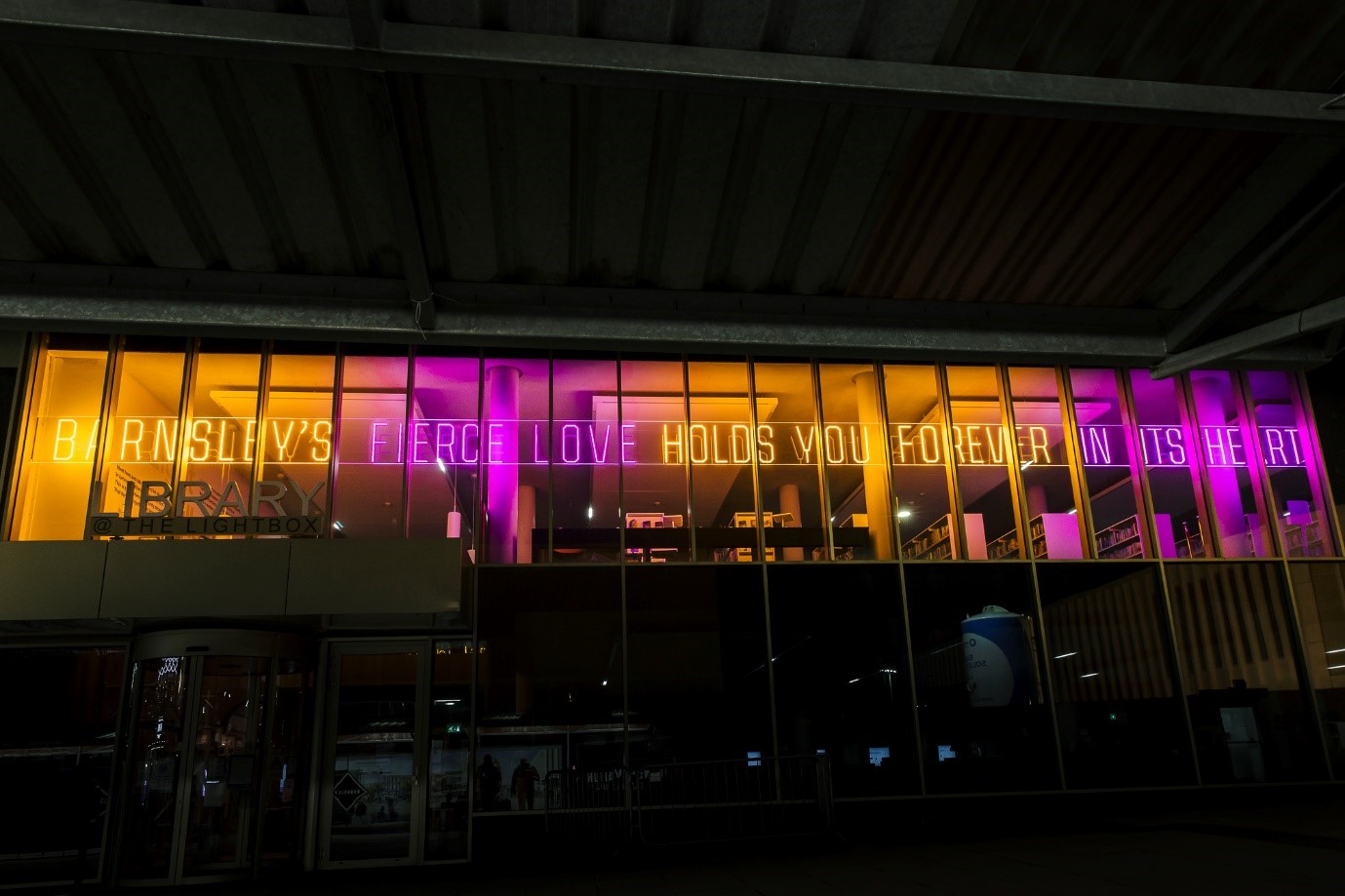
Written by poet Ian McMillan and brought to life in the window of the new Library @the Lightbox by local artist Patrick Murphy, the words represent those who lost their lives to COVID-19 and serve as a tribute to key workers and unsung heroes of the pandemic. A memorial sculpture by local artist and sculptor Graham Ibbeson and featuring ordinary working people will be unveiled in the space opposite later in the Autumn of 2021.
Visiting this spot during a pre-supper ‘walkshop’ of the town centre with new TechRevolution 2.0. city partners from across the EU, felt oddly fitting. For many of us this was our first face to face European meeting since the start of the pandemic. For participants from partner towns and cities in Lithuania, Poland, Croatia and Belgium, this was their first visit to Barnsley. The commitment and energy from the local team in Barnsley was tangible. The words felt strangely appropriate. As someone who has worked with the Barnsley team for coming up to 10 years, they really resonated. There’s something magnetic about this place and, more importantly, the people in this gritty South Yorkshire town.
But what has this got to do with TechRevolution? This article seeks to explore what it is about ‘Barnsley’s fierce love’ that has enabled it to be recognised regionally, nationally and internationally as a tech hub. It considers some of the key success factors and then briefly introduces the 4 new cities which will, we hope, be able to learn from, adapt and transfer some of the activities that together have put Barnsley on the map.
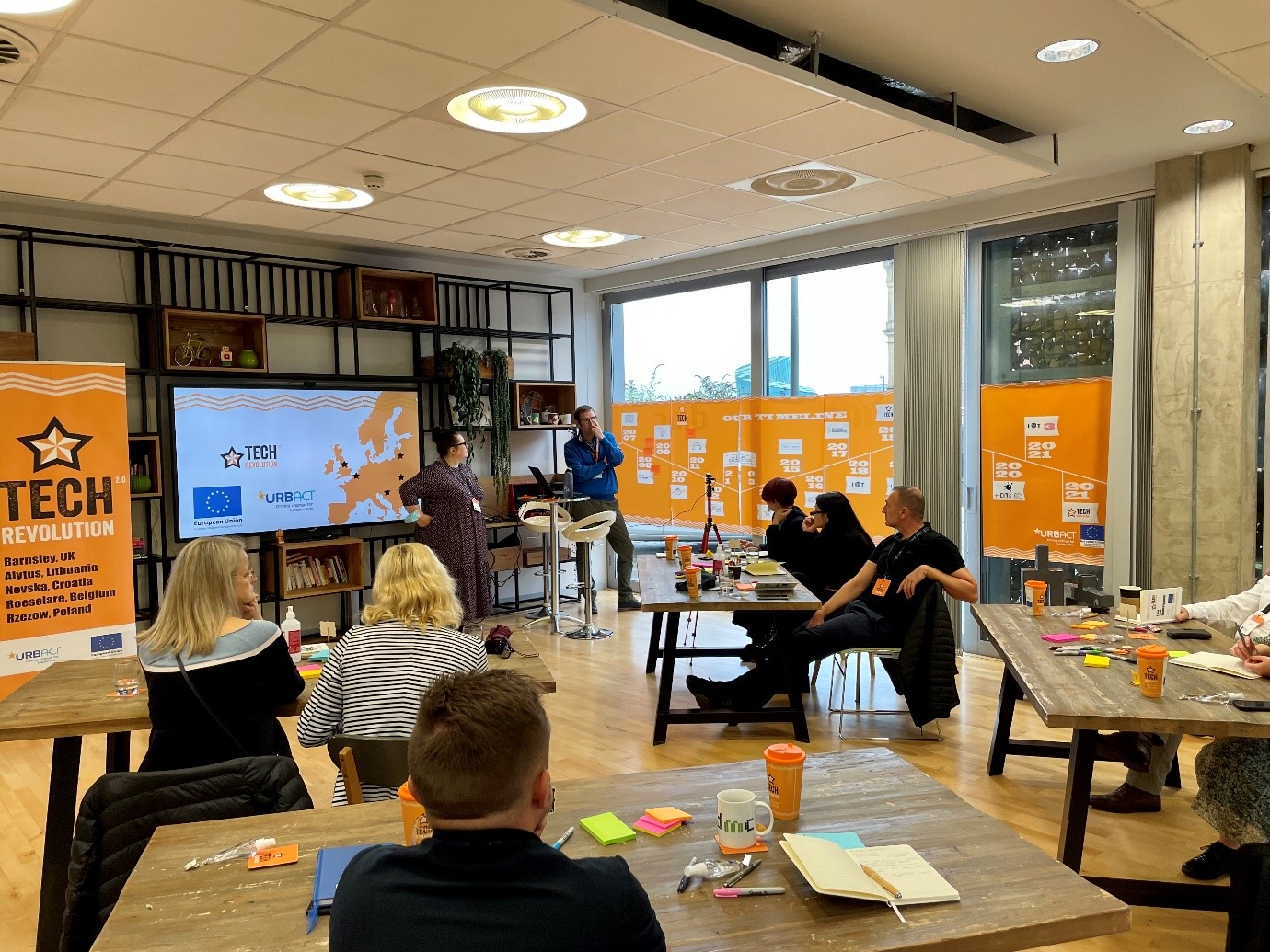
Done is better than perfect
The first day of the 3-day meeting focused on the 2-pronged good practice (summarised here):
• Enterprising Barnsley
• Digital Media Centre 01 and 02 (DMC 01 and DMC 02)
Using a complex timeline which spans almost 15 years, Tracey Johnson, DMC Manager and Martin Beasley, Enterprising Barnsley Group Leader, walked the new partners through the key milestones, highlights and challenges. The good practice is complex and multi-faceted and there is no way that the new partners will be able to transfer all of it in the 15 remaining months of the new URBACT network but the curiosity in the room was palpable and the questions kept coming. One of the things that always strikes me about the Barnsley team is their honesty about the imperfections, lessons learnt and ongoing challenges. One of the key messages for me can be summed up in the entrepreneur’s mantra – ‘done is better than perfect’. Adopting this approach in Barnsley, whilst not explicitly set out or even recognised as a defined way of working, has enabled the local team and wider stakeholder group to get results, avoid paralysis, fix mistakes along the way and be ambitious but realistic about what is achievable. This is an important early message for the new TechRevolution partners.
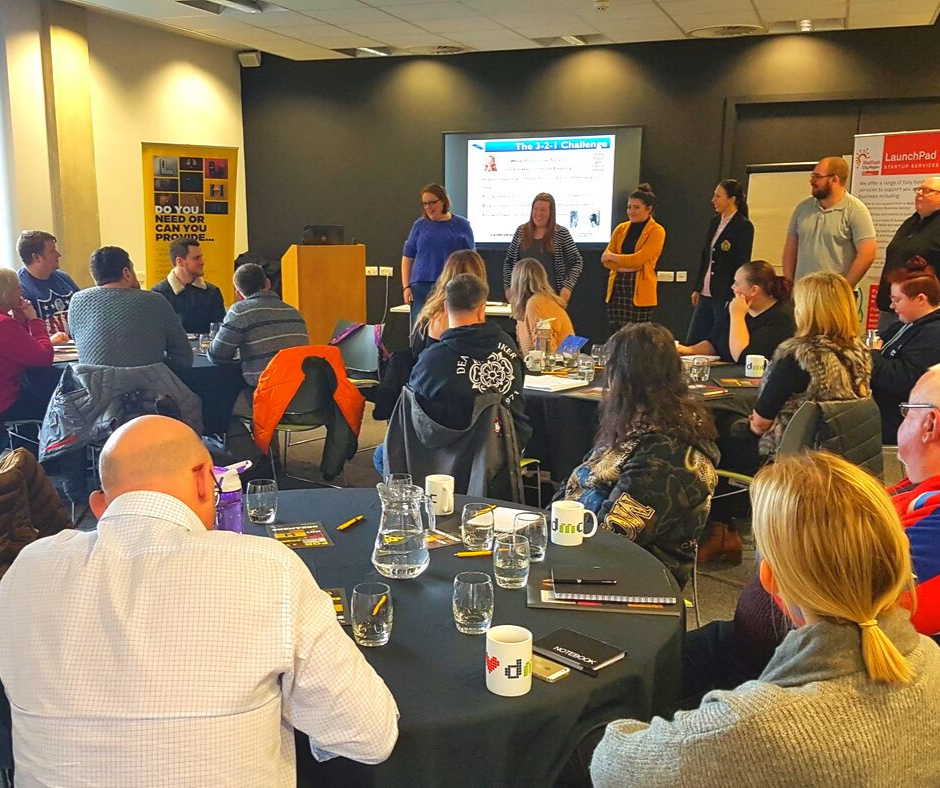
Customer first
At lunchtime on the first day of our 3-day meeting, we had to move to a different room for the afternoon. Having planned the meeting since July, I found myself feeling mildly irritated by the disruption and inconvenience, especially as the partners had travelled so far (and done so many COVID tests) to be with us at the DMC. However, when I asked why we had to move, I was politely informed that the best room in the building was being used for a ‘Launchpad’ workshop that afternoon. As we had lunch in the incredible space that is the atrium of DMC 01, I watched a group of new business owners arriving and settling in for a 2-hour workshop – one of 3 core elements of the programme which supports new companies in Barnsley to start up and grow. Part of the URBACT good practice, Launchpad offers:
• A dedicated Business Advisor right from your first appointment.
• Free training & workshops
• A bespoke package of support tailored to your needs.
• Opportunity to get involved in annual Launchpad Awards.
Launchpad is the perfect place for new business founders and prestarts to build up their knowledge, develop their ideas and ultimately gain the confidence they need to get started….
The workshop being delivered that afternoon was one of 3 core workshops designed to support founders through the start-up process.
• Module 1: Covers business planning – Where founder turn their ideas into a plan.
• Module 2: Looks at legal structures, business finances as well as bookkeeping & tax.
• Module 3: Will help founders develop a solid marketing strategy.
Founders can also access 121 support with their dedicated business advisor at any stage and access a range of other sessions to develop their skills on in key business areas such as, social media or creating a website.
I quickly realised that us being shifted out of the room was a clear demonstration of Barnsley’s ‘customer first’ approach. The TechRevolution partners were there to learn about the good practice and were of course a priority. But the Enterprising Barnsley / Launchpad customers – the businesses – would always – and quite rightly - come first.
Walk the talk
Linked to the above, the way that the Barnsley team functions has increasingly mirrored behaviours and practices in the start-up world. Even within the constraints of local government machinery, they have managed, at least to an extent, to adopt some agile methodologies. Some of the new partners seemed a bit perplexed as to how this had been possible within a public sector organisation. Some clearly did not believe it would be possible back in their home towns and cities. This will be a challenge we hope to at least reflect upon, and possibly even partly address, during our time working together.
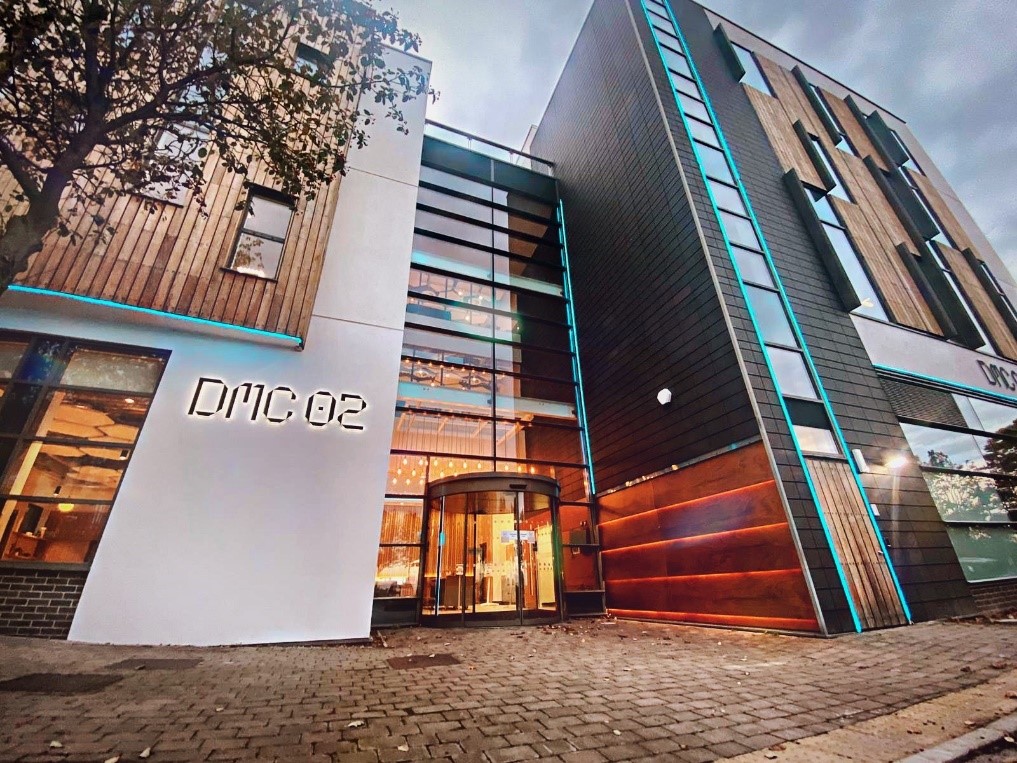
Dare to dream
At the end of the first day, we had an opportunity to visit both DMC 01 and DMC 02. For me this was a particularly special moment. I vividly remember a conversation with Tracey during one of my previous visits to Barnsley, probably about 5 years ago when Barnsley was leading its first URBACT Action Planning Network TechTown. We were discussing the need for more ecosystem-wide work and for more grow-on space for local businesses. She pointed to a run-down building at the back of the then DMC and said, ‘we’ve been wondering if we could do something with that one’. Subsequently the local URBACT Group imagined what a digital campus might look like, somewhere that brought together business, ecosystem stakeholders, education and research in a central location and from which a thriving digital economy might grow. This idea was then embedded as the key goal of the URBACT Integrated Action Plan. Fast forward 5 years and the team has acquired the building, raised funding to refurbish it, launched The SEAM – Barnsley’s Digital Campus and opened the doors of DMC 02 during the peak of the COVID crisis. It’s not quite full yet but as we toured the new Maker Lab and looked at some of the occupied and vacant offices, I was reminded of how important it is for places and people to ‘dare to dream’. Again, this is an important message for our new partners, some of whom might have been feeling a bit over-whelmed by the scale of the good practice they were here to learn about.
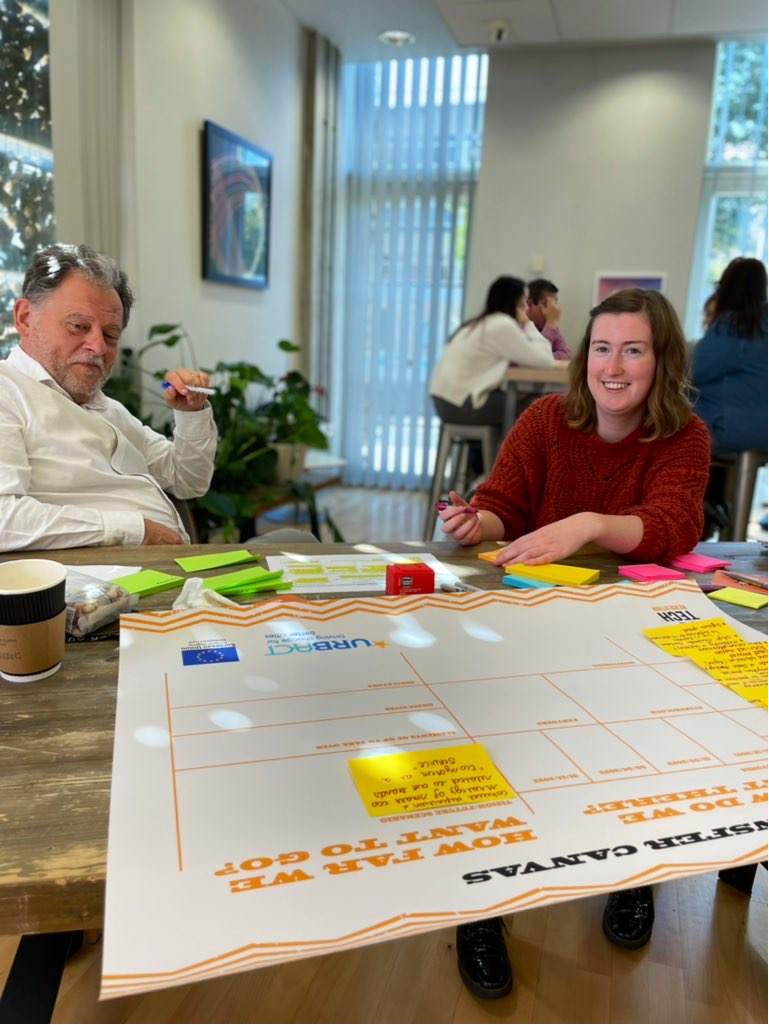
Good things come to those who wait
On the morning of the 2nd day together, after some much-needed and long-awaited social time together the previous evening, we started to work more on which elements of the good practice might be transferable to the partner cities both in the short and medium term. One of the things that most, if not all, of them said was how impressed they were by the long-term approach that Barnsley had taken. This was not something I’d really considered properly before but they are right: although the local team has always been nimble and opportunistic, they’ve also had a very clear goal throughout. More than a decade ago, the local authority made a clear commitment to prioritise economic transformation and move away from mining and manufacturing and towards higher value knowledge-based sectors such as creative, digital and tech. This does not mean they have forgotten their industrial heritage, far from it. In fact, a lot of the more recent elements of the good practice are driven by a desire to support digitalisation of traditional businesses e.g. by supporting Internet of Things innovations in local manufacturing and health companies. Some of these activities were probably beyond the wildest dreams of the local team even a few years ago but with patience and perseverance comes reward.
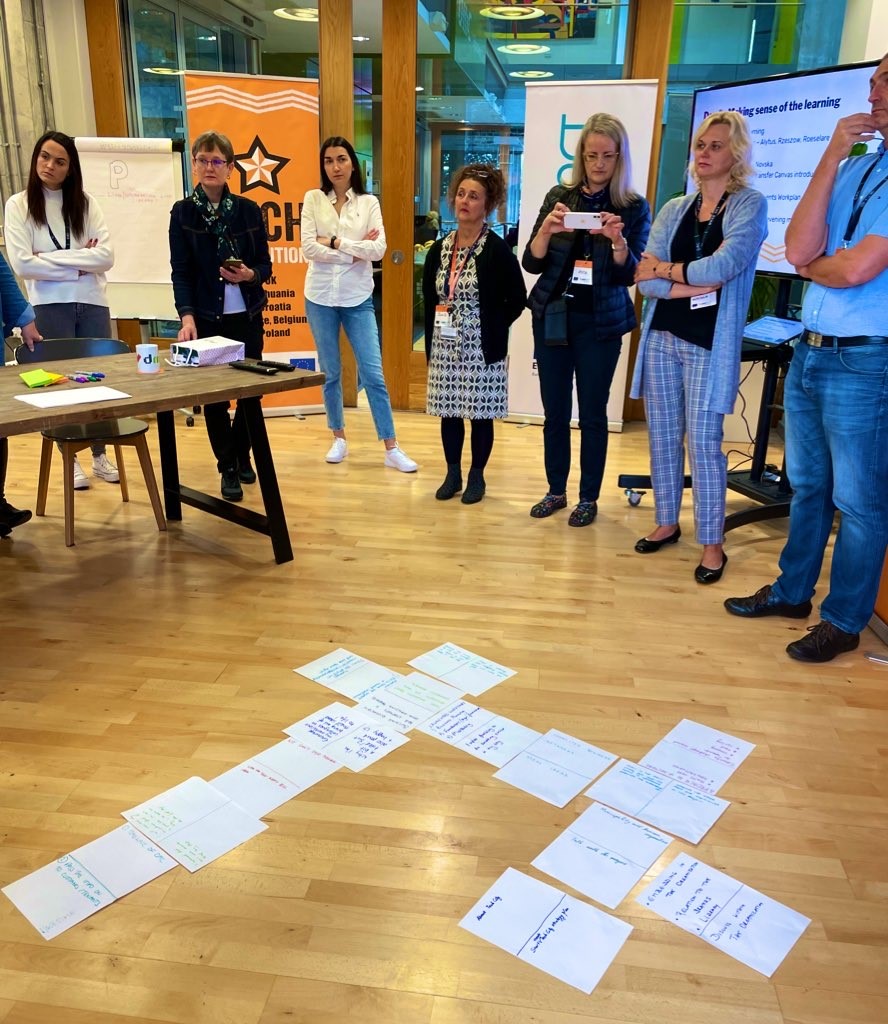
If you can’t measure it, you can’t improve it
The final key message, as we continued to work on the Transfer Canvases and considered the role and practicalities of the URBACT Local Group, was the importance of monitoring and evaluation. Barnsley has constantly collected and collated key information on performance metrics. Project staff are able to talk about, with some certainty, the quantitative impact that all of their work on Enterprising Barnsley and DMC 01 and 02 has had. This is particularly important when it comes to influencing policies under development and getting the support and buy-in from high level staff and politicians. It also supports the council’s ability to continue to attract grants from a wide range of sources, something which has been a key success factor for Barnsley. Linked to the entrepreneurial attitude mentioned above, we heard how staff not only constantly iterate and develop new project ideas, but they are also continually on the look out for new resource opportunities. Having both robust data on work done to date and the ability to secure additional funding has enabled the Barnsley team to gain the trust and support of key local, regional and national funders and decision makers. This has facilitated their ability to bring innovative projects on stream and to constantly improve their work.
Meet the new TechRevolution partners
It would be remiss of me to write my first article about TechRevolution 2.0. without mentioning the stars of the show – the new transfer partners. These four towns and cities now have an intensive 15 months of work ahead of them, all aimed at supporting them to learn about, adapt and transfer elements of Barnsley’s good practice. This will be supported by regular transnational learning and exchange activities as well as the all-important URBACT Local Group. Within the next month each partner will use the Transfer Canvas we worked on during the Kick Off meeting to inform their Transfer Roadmap. I will write more about these after our next Transnational Event so, for now, here are some key stats on our new cohort:
Meet Alytus, Lithuania
- The sixth largest Lithuanian city with population of 54 700
- The cultural and industrial centre of Southern Lithuania
- Prosperous industrial city in the past with remaining infrastructural and human potential – more recently famous for the high-quality manufacturing
- Home to 39 educational institutions
- Keen to develop a digital economy to support growth
Meet Novska, Croatia
- Less than 100 km southeast of Croatian capital Zagreb
- Population of just 13,518
- Dominated by traditional industry, agriculture & tourism but recently adopted gaming as a key growth-potential sector
- Dominated by traditional industry, agriculture & tourism but recently adopted gaming as a key growth-potential sector
- Keen to grow this sector and to link it with local businesses
Meet Roeselare, Belgium
- Located at the heart of West Flanders
- Population of 68,349 (and growing)
- Focusing on retail, cycling, food and care as key employment sectors
- Keen to see how tech can support this growth and lay the foundations for the next policy period (elections in 2024)
Meet Rzeszow, Poland
- Located in the South East of Poland on the border with Slovakia and the Ukraine
- Population of 200,000 of which 40,000 are students
- Home to aviation cluster
- Recently opened Urban Lab Rzeszow as a space for developing innovation solutions for the city
- Keen to develop an offer to support local start ups
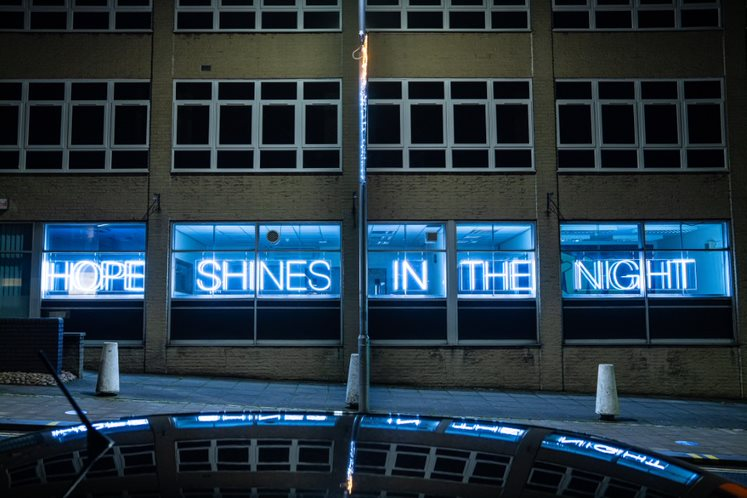
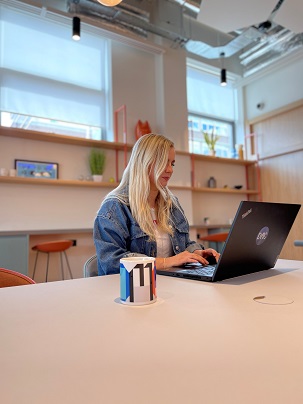 Submitted by Justine on
Submitted by Justine on
